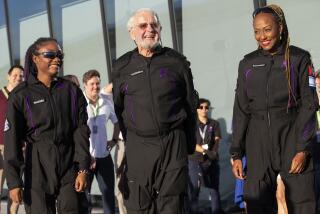Space tourism race gains speed with Xcor plane
- Share via
Xcor Aerospace Inc. announced Wednesday that it would enter the space tourism market with a rocket plane that would carry passengers for about $100,000 a ride.
The Lynx will take off under its own power, carrying just a pilot and a single passenger, the Mojave, Calif., company said at a news conference in Beverly Hills.
Each flight will reach an altitude of 200,000 feet, close enough to space that passengers will experience about 90 seconds of weightlessness. Flight testing of the Lynx is expected to begin in 2010.
Xcor is the second company to jump into the commercial space tourism business. Aircraft designer Burt Rutan’s Scaled Composites, which also operates out of Mojave, recently unveiled its entry, SpaceShipTwo.
Unlike the Lynx, Rutan’s craft has six seats and is carried aloft by a larger conventional aircraft and then rockets to a suborbital altitude.
British billionaire Richard Branson has announced that his space tourism company, Virgin Galactic, will start test-flying Rutan’s vehicle this year.
Branson said he has booked $30 million in deposits from passengers at a projected single-ticket price of $200,000.
Jeff Greason, one of the founders of Xcor, said he hoped to make up for Lynx’s limited passenger space by making as many as four trips a day into space.
Xcor test pilot and former NASA astronaut Rick Searfoss said the sights, from the blackness of outer space to the curvature of the Earth, would be just as memorable to passengers.
Greason acknowledged that the flights are not cheap. But comparing it to other once-in-a-lifetime experiences, such as climbing Mt. Everest, he is convinced that the market can support more than one space tourism business.
Although Branson’s tourists will get to space first, Greason said he wasn’t worried.
“I’m not that interested in who’s first,” Greason said. “It’s better to be right” about the best business model.
--
More to Read
Inside the business of entertainment
The Wide Shot brings you news, analysis and insights on everything from streaming wars to production — and what it all means for the future.
You may occasionally receive promotional content from the Los Angeles Times.










